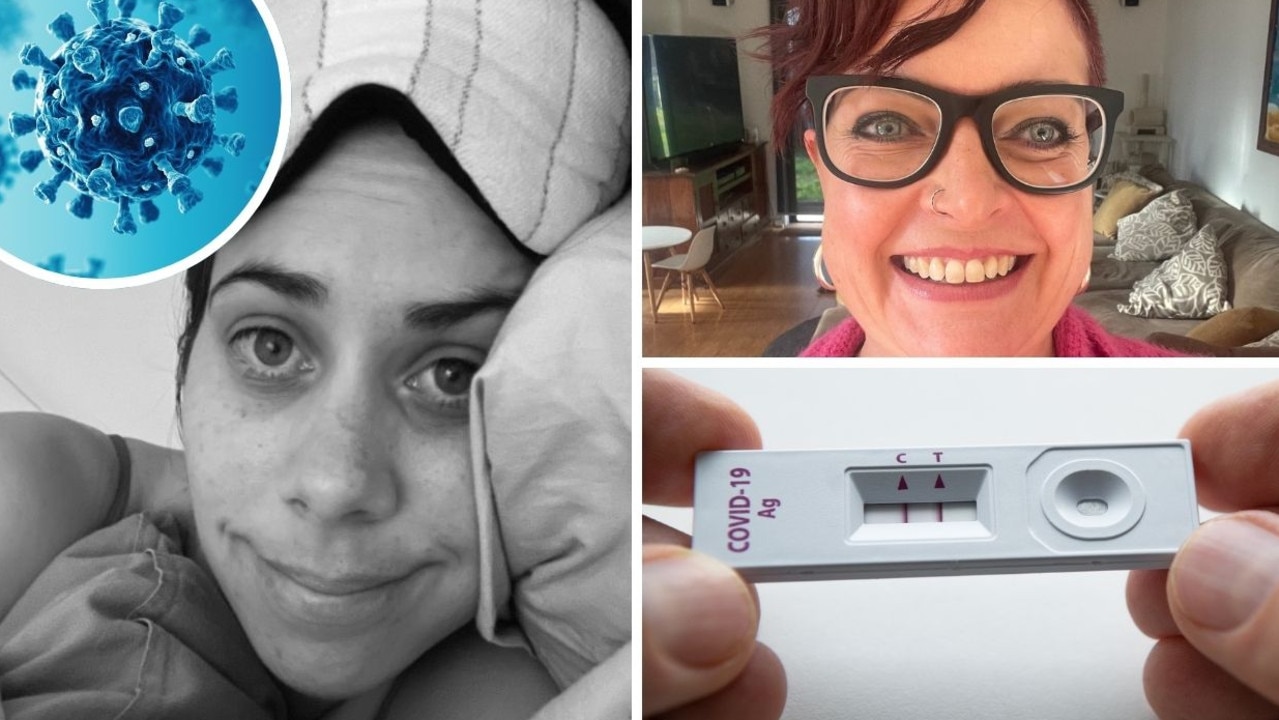Coronavirus world: Hong Kong suspends court system as Covid crisis worsens
Hong Kong has gone to extreme lengths to kerb its worst Covid outbreak amid record cases and panic buying across the city.
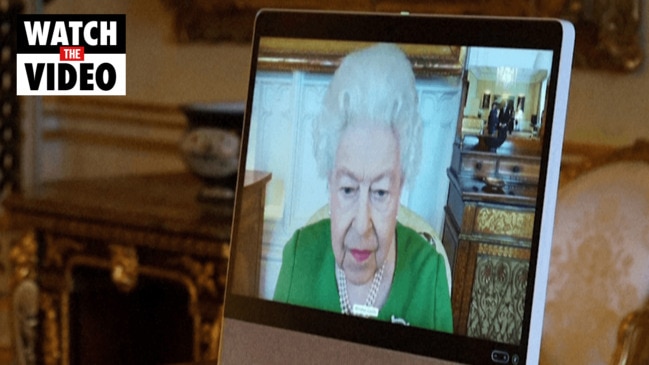
Coronavirus
Don't miss out on the headlines from Coronavirus. Followed categories will be added to My News.
Hong Kong took the extraordinary measure of suspending its entire judiciary as the city’s Covid crisis worsened with panic buying and more than 50,000 new cases for the third consecutive day.
The finance hub is in the throes of its worst outbreak to date, overwhelming hospitals and shattering the city’s zero-Covid strategy.
The judiciary said it would adjourn most court hearings between March 7 and April 11 after “striking a balance between public health considerations and due administration of justice”.
Authorities said on Wednesday around 1,000 prisoners have tested positive and local media reported that judges had also been infected.
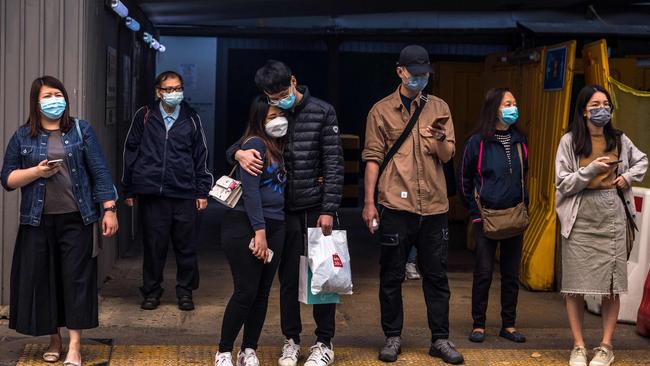
The suspension excludes ongoing hearings and urgent applications while some in-person proceedings will be dealt with on paper instead.
The judiciary added that it may need to further cut back operations in light of the mandatory virus testing slated for the city’s entire population later this month.
Hong Kong on Friday saw 52,523 new infections bringing the total to more than 390,000 since the highly transmissible Omicron variant broke through.
There have been 1,341 deaths in the latest wave among a population of 7.4 million, with more than half of the deceased being elderly people living in care homes.
While nearly 90 per cent of Hong Kong residents have received at least one vaccine dose, the figure falls to 67 per cent for those aged 70 or above.
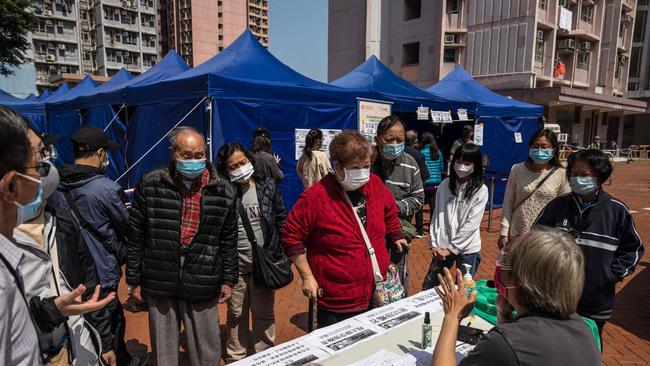
Coronavirus cases have been found in more than 70 per cent of Hong Kong’s elderly care homes, with at least 13 per cent of residents infected, officials said Friday.
Meanwhile, one of Hong Kong’s largest supermarket chains and a major pharmacy chain both announced rationing of staple goods after facing a wave of panic buying this week.
Some supermarket shelves have been stripped bare in the wake of mixed messaging from Hong Kong’s top officials on whether there will be a lockdown.
Hong Kong leader Carrie Lam said the government will conduct citywide virus testing this month and that measures will be taken to reduce the public’s movement, though no details have been announced.
Lam promised this week that Hong Kong would not go into “wholesale city lockdown” during the testing.
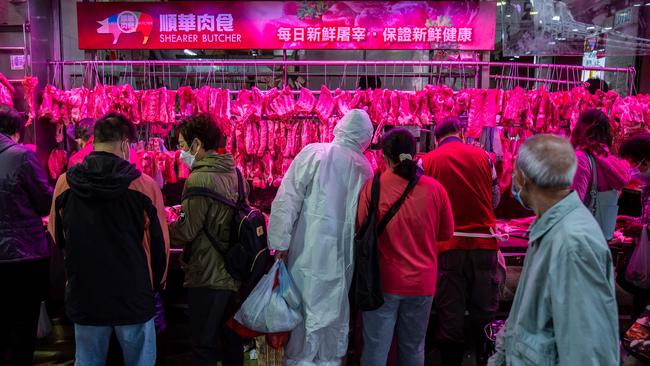
ANTI-COVID PILL GETS GREEN LIGHT
The World Health Organisation, meanwhile, has recommended an anti-Covid pill be taken by sufferers who have mild symptoms but are at high risk of hospitalisation, such as older people or the unvaccinated.
The pill, called molnupiravir and developed by US pharmaceutical Merck, is taken as soon as possible after Covid-19 symptoms develop and then for the following five days.
A WHO group of experts said in the British Medical Journal that people with weak immune systems or chronic disease were also recommended to take the pill if they had non-severe Covid.
However “young and healthy patients, including children, and pregnant and breastfeeding women should not be given the drug due to potential harms,” they said.

The UN agency’s new recommendation was based on the results of six randomised controlled trials involving 4,796 patients, the “largest dataset on this drug so far”.
The trials suggested that molnupiravir reduced the risk of going to hospital, with 43 fewer admissions per 1,000 high-risk patients, as well as speeding up the pace at which symptoms cleared up by an average of 3.4 days.
There was less indication it had an affect on mortality, with just six fewer deaths per 1,000 patients.
The WHO acknowledged “that cost and availability issues associated with molnupiravir may make access to low- and middle-income countries challenging and exacerbate health inequity”.
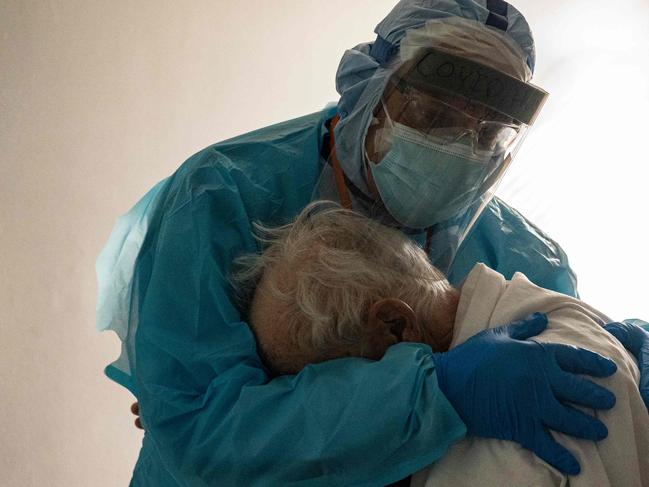
While vaccines remain the foremost tools in the fight against the pandemic, experts have welcomed the addition of the new oral treatments, which inhibit the virus’ ability to replicate and should withstand variants.
The only other main anti-Covid pill available is Pfizer’s Paxlovid. However more potential concerns have been raised about Merck’s pill, which the US Food and Drug Administration has not authorised for under-18s because it could affect bone and cartilage growth.
FRANCE TO DROP VACCINE PASS
France will this month end most Covid-19 restrictions and scrap its vaccine pass for eating out or attending cultural events, the prime minister said.
After the surge in cases caused by the Omicron variant, the health situation has improved over the last weeks with less pressure on hospitals, Prime Minister Jean Castex said in a statement.
He said that from March 14 the vaccine pass — proving that someone has been triple vaccinated against Covid-19 — will no longer be needed.
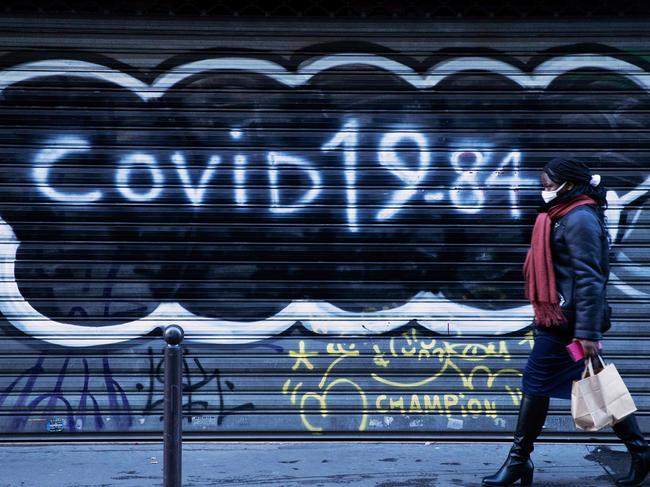
The pass, whose introduction last year initially caused angry protests, had been obligatory to go to a cafe or restaurant, travel by intercity train or visit venues like cinemas and theatres.
A similar pass will however be needed to go to a hospital or a retirement home in order to protect the most vulnerable, Mr Castex added.
Masks will from March 14 only be required on public transport, meaning that their use will no longer be required in the workplace or at school, he said.
France has recorded 138,762 deaths from Covid-19 since the start of the pandemic two years ago but in recent months has largely avoided the more stringent restrictions adopted by some neighbours.
President Emmanuel Macron is likely to point to his handling of the pandemic as he campaigns for re-election in polls next month, although the campaign is being eclipsed by Russia’s war on Ukraine.
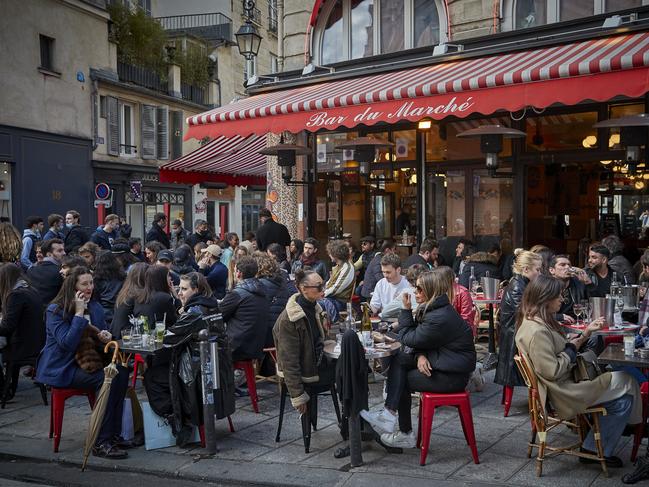
HONG KONG TRAVEL WARNING
Meanwhile, the US warned citizens against travelling to Hong Kong, citing the risk of children being separated from parents as the Chinese city imposes controversial coronavirus isolation policies.
The State Department upgraded Hong Kong to its highest “Do Not Travel” warning “due to COVID-19 related restrictions, including the risk of parents and children being separated”, on Wednesday.
“In some cases, children in Hong Kong who test positive have been separated from their parents and kept in isolation until they meet local hospital discharge requirements,” the State Department added.
The Asian financial hub is in the grip of its worst coronavirus outbreak, registering tens of thousands of new cases each day, overwhelming hospitals and shattering the city’s zero-Covid strategy.
China has ordered local officials to stamp out the outbreak even as studies estimate as many as a quarter of the city’s residents may have been infected in the current wave.
Authorities plan to test all 7.4 million residents later this month and are scrambling to build a network of isolation camps and temporary hospitals, with China’s help, to house the infected.
“It remains our policy objective to subject all confirmed people to isolation at places other than their places of accommodation so as not to infect others,” city leader Carrie Lam wrote in a progress report this week.
That has deepened anxieties about family separations in the months ahead and the warning by the United States is the first time the risk has been specifically cited in a travel advisory.
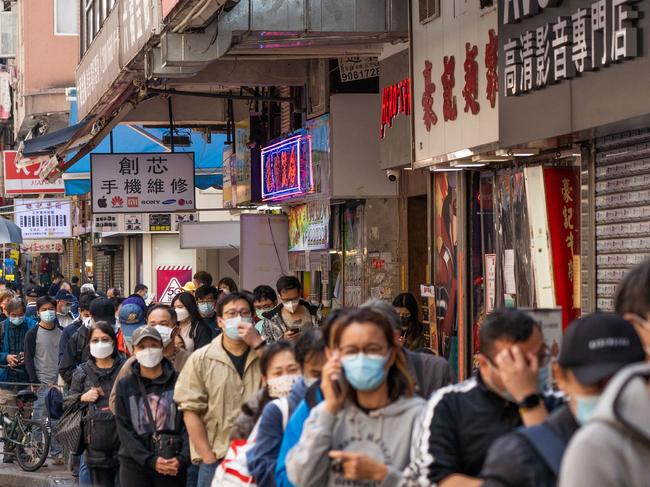
QUEEN RETURNS TO DUTIES AFTER Covid SCARE
Queen Elizabeth II has resumed royal duties after she was forced to cancel engagements last week due to Covid.
The head-of-state held two virtual audiences on Tuesday, Buckingham Palace said.
Concerns have mounted for the 95-year-old monarch’s health since she tested positive on February 20, overshadowing the start of her record-breaking 70th year on the throne.
But a palace statement indicated she was now well enough to hold engagements, hosting the new ambassadors of Andorra and Chad from her home at Windsor Castle.
The Queen last week cancelled similar scheduled engagements with new ambassadors as she was suffering from what were described as “mild” Covid symptoms.
A diplomatic reception she was also due to attend on Wednesday this week was cancelled on the advice of Foreign Secretary Liz Truss, due to Russia’s invasion of Ukraine.
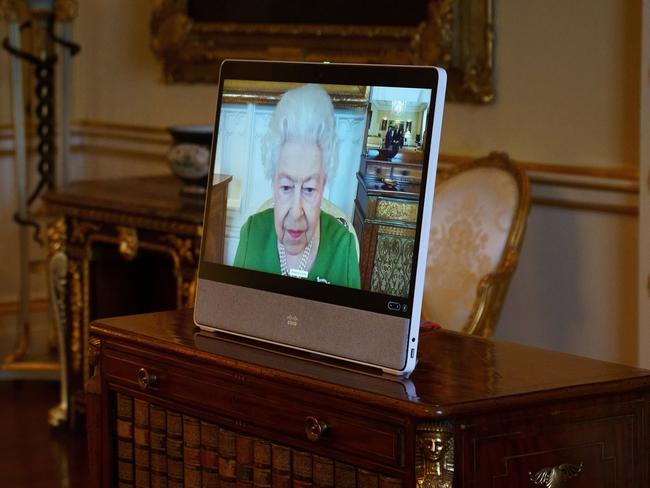
Buckingham Palace has said it will not give a running commentary on the head of state’s health, but confirmation she is undertaking duties again will be seen as a positive.
She was forced to slow down on medical advice after spending a night in hospital following unspecified tests in October last year.
She has rarely been seen in public since.
The Queen became the first monarch in British history to reign for 70 years on February 6, and public celebrations are planned to mark the event in early June.
HUGS, TEARS AS NEW ZEALAND RELAXES BORDER
At Auckland airport, relatives carrying signs such as “welcome home my dearest daughter” scooped up loved ones who are now allowed into the country without mandatory hotel quarantine for the first time in almost two years.
New Zealand Prime Minister Jacinda Ardern said the change was cause for celebration, particularly for the tens of thousands of New Zealanders overseas keen to return home.
“We can’t wait to see you,” Ms Ardern told reporters in Wellington. “It’s also a huge milestone for our tourism sector and regional economies.”
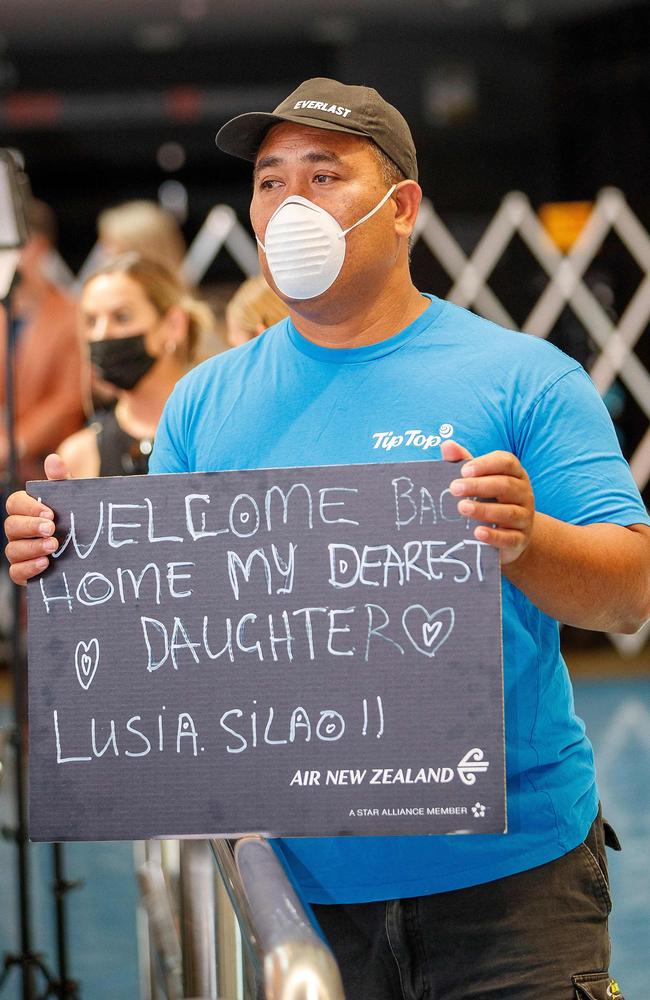
Until now, Kiwi expats entering the country needed to undergo 10 days of isolation in expensive and oversubscribed hotel accommodation.
The requirement was dropped for New Zealanders arriving from Australia on Monday and will be extended to all expatriates on Friday.
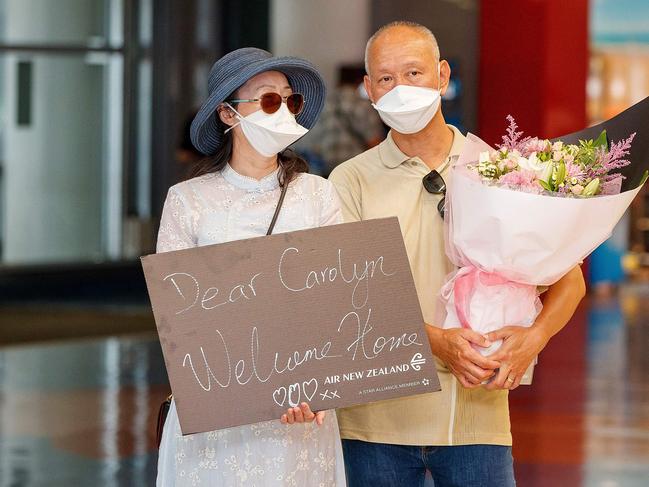
Ms Ardern said the arrivals will not have to self-isolate, as originally planned. She also said the government was planning to speed up the staged reopening of the border to all travellers, although no timetable has yet been set.
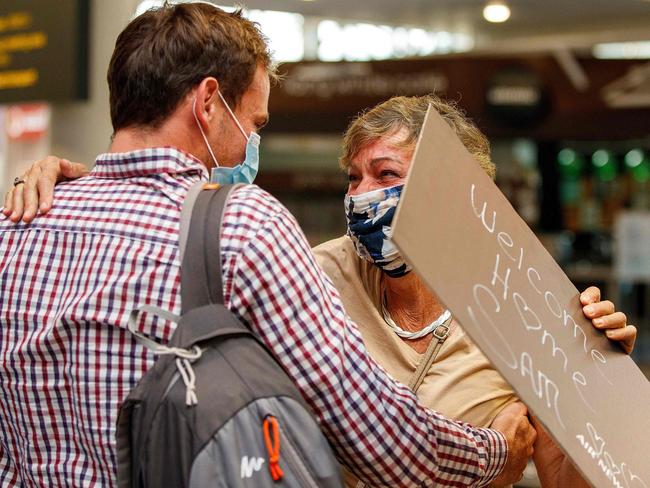
Ms Ardern said the rapid spread of the Omicron variant in the community meant the impact of cases at the border was less pronounced, allowing restrictions to be removed earlier.
“Every time we have seen a significant change in the pandemic, we’re moving very rapidly to safely adjust what we do,” she said.
Strict border controls were a key part of New Zealand’s success containing coronavirus, with only 56 deaths recorded in a population of five million.
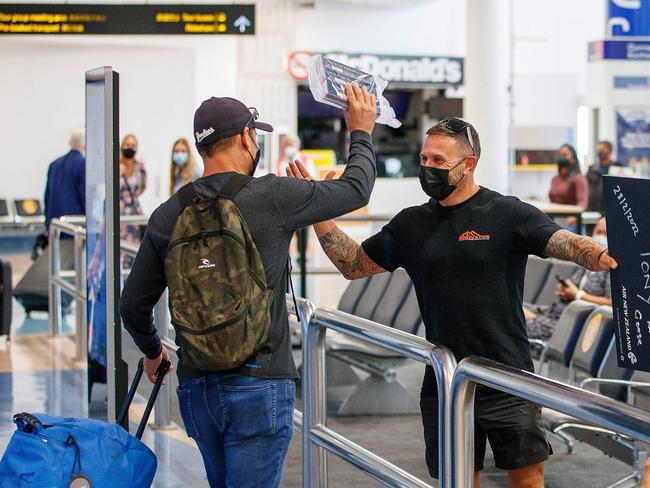
But the Omicron outbreak has surged in recent weeks, with 14,657 new cases reported Monday, and Ms Ardern said the country’s high vaccination rate of about 95 per cent “provides a strong blanket of protection”.
“Cabinet has agreed to lift all self-isolation requirements for vaccinated travellers entering New Zealand,” Covid-19 Response Minister Chris Hipkins said in a statement. “That means that all Kiwis coming home and tourists entering the country will be able to step off the plane and immediately connect with family and friends and enjoy all New Zealand has to offer.”
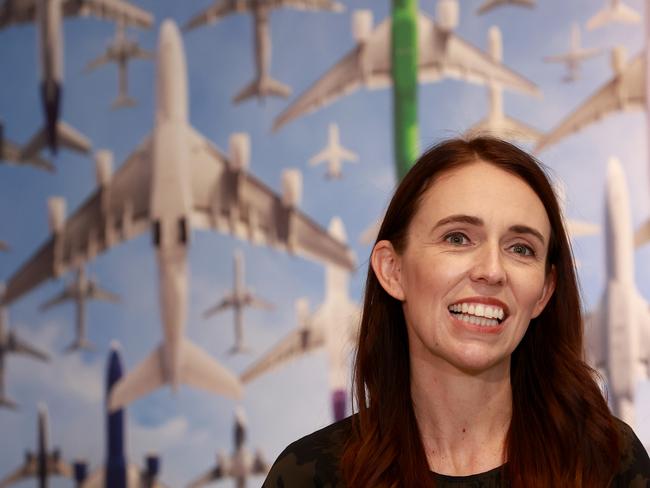
Cabinet will review the timings of the remaining steps in the coming weeks, Ms Ardern said. This includes temporary work and student visa holders currently outside New Zealand.
Australian visitors had been expected to have to wait until July, but Ms Arden indicated that would likely be moved forward also.
MASKS CHANGE FOR AMERICANS
Most Americans will no longer have to wear masks in indoor public spaces.
The top US health agency has drastically revised its guidelines for masking to stop Covid-19 transmission, a decision that means most Americans won’t be advised to wear them in indoor public spaces, including schoolchildren.
“We’re in a stronger place today as a nation with more tools to protect ourselves and our communities from Covid-19,” said Rochelle Walensky, director of the Centres for Disease Control and Prevention (CDC) in a call with reporters.
The changes involve the metrics used to determine whether people should mask up. Under previous guidance, this was pegged to case rates — with 95 per cent of the country considered areas of high or substantial transmission, and thus covered by mask advisories.
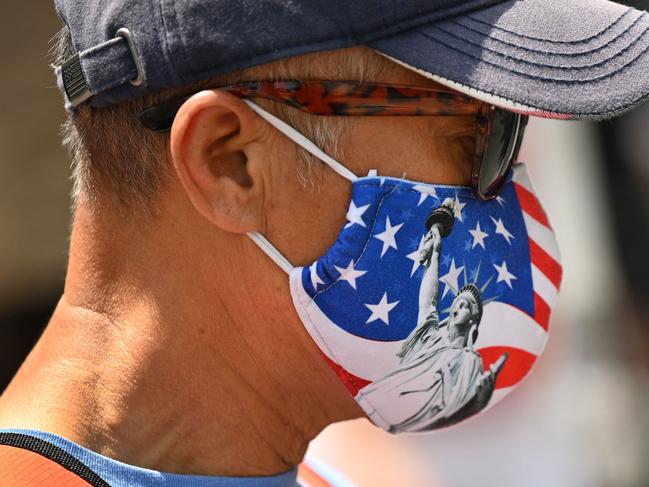
The new metrics use caseloads but also include Covid hospitalisation and local hospital capacity, to create a new measure known as “Covid-19 community level.” Residents can look up on the CDC website whether their area is green, yellow or orange on a national map.
Now, more than 70 per cent of the population live in areas that aren’t advised to mask up according to the new framework, including schools in the green or yellow areas.
Calls to lift school mask mandates had multiplied in recent weeks, as concerns grew about their impact on children’s social, emotional and educational development.
Ms Walenksy said the new guidance was statistically rigorous, but could be reviewed “if or when new variants emerge, or the virus surges.”
The revised guidelines don’t however apply to transport systems. A federal rule on that will be reviewed in mid-March when it is set to expire.
The United States is coming out of its latest Covid wave, driven by the Omicron variant, which while highly transmissible, generally leads to less severe outcomes among people who were vaccinated or had a prior infection.
Some 65 per cent of the US population are now fully vaccinated, and high caliber masks, such as N95s, which provide strong one-way protection to wearers, are now more widely available for people who require them, such as the immune compromised.
The Biden administration has increased normalisation as the pandemic transitions to a new endemic phase.
The guidance is largely symbolic, since both Republican and Democrat-led states and cities have already taken the lead, either dropping their mandates or setting imminent timelines for doing so.
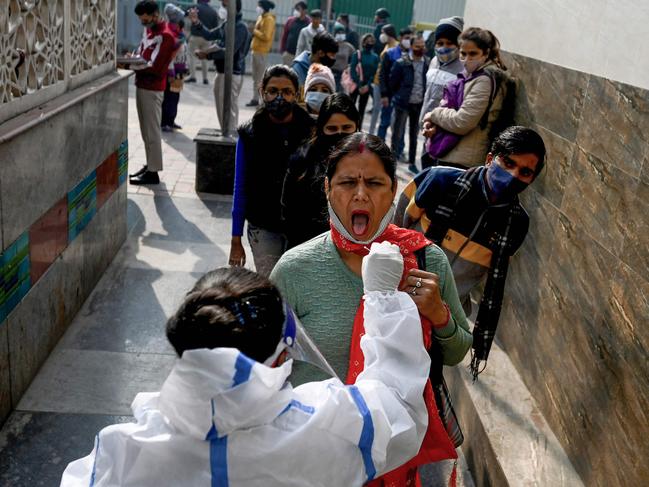
NEW DELHI BACK TO NORMAL
India’s capital has announced the end of all the remaining coronavirus restrictions after government data showed cases of the recent Omicron variant had fallen.
The country recorded 11,499 new daily cases and 255 deaths, according to the health ministry’s latest statistics on Saturday, a tiny fraction of those seen during the devastating peak last year.
Local officials in the Delhi region, which recorded 460 cases and two deaths Friday, decided to lift a night curfew and allow restaurants to operate at full capacity.
Places of religious worship were also permitted to reopen.
Schools will function fully offline from April 1 while fines for not wearing masks were also reduced.
The area’s disaster management authority “withdraws all restrictions as situation improves” and because people were “facing hardships due to loss of jobs”, Delhi’s chief minister Arvind Kejriwal announced on Twitter.
India was battered by a devastating Covid outbreak last year that saw 200,000 people killed in a matter of weeks, overwhelming hospitals and crematoriums.
Since the outbreak in 2020, India has officially recorded 42,905,844 cases and 513,481 deaths, third behind only the US and Brazil.
DUTCH: ‘Covid IS OVER, NOW IT’S TIME TO PARTY’
Decked out from head to toe in fancy dress, singing and dancing as the beer flows free, Dutch revellers celebrated carnival on Friday, as the Netherlands axed most Covid restrictions.
The country is one of the last in Europe to ease towards normal after last December imposing some of the continent’s toughest measures to kerb a surge in Omicron infections, especially unpopular among Dutch party animals.
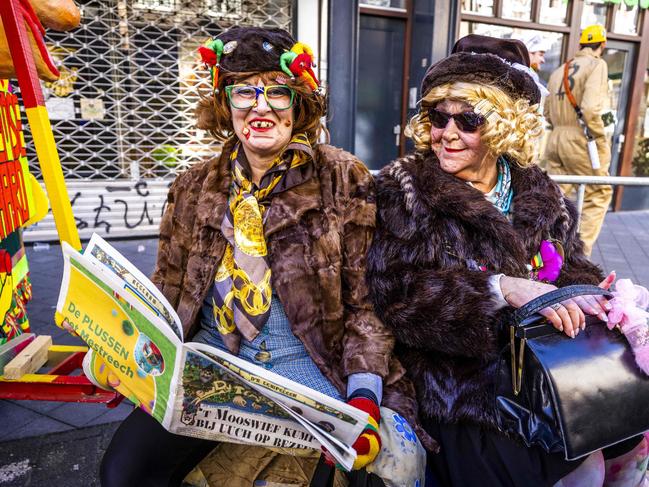
“Covid is over, now it’s time to party,” said Senna Godefroy, 26, dressed in a yellow and florescent orange jumpsuit in the carnival town of Breda in the southern Netherlands.
Friday saw bars and restaurants allowed to stay open beyond 1:00am, health passes dropped and social distancing axed. Masks remain compulsory only on public transport.
In Breda, hundreds of people thronged bars and cafes in balloon-festooned streets as music blared out and disco balls glittered again until late.
“It’s weird that everything is suddenly free of measures but it’s fantastic,” said Jesper Naio, a 22-year-old financial Adviser.
“We’ve been waiting for it for so long,” said Sanne van de Wael, a 22-year-old student.
Carnival season in 2020 marked the start of coronavirus spreading in the Netherlands.
With a population of 17 million people, the Netherlands has recorded 21,414 deaths linked to Covid-19 and 5.8 million cases during the pandemic. More than 85 per cent of the adult population is vaccinated.
“Two years to make up for,” chanted party goers in Breda, brimming with enthusiasm, wearing flower garlands and carnival masks.
More Coverage
Originally published as Coronavirus world: Hong Kong suspends court system as Covid crisis worsens




